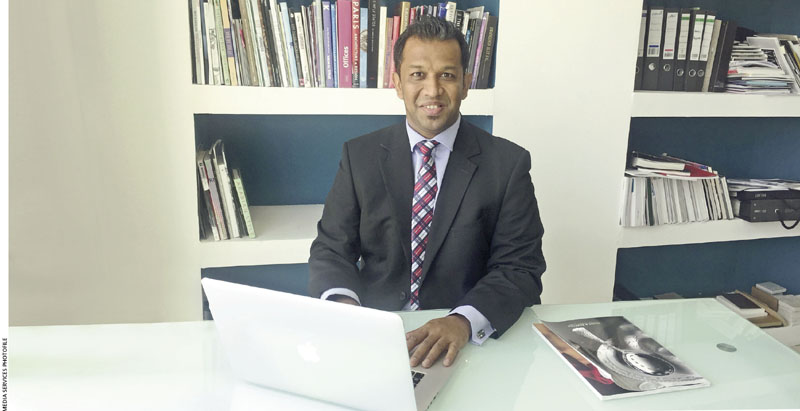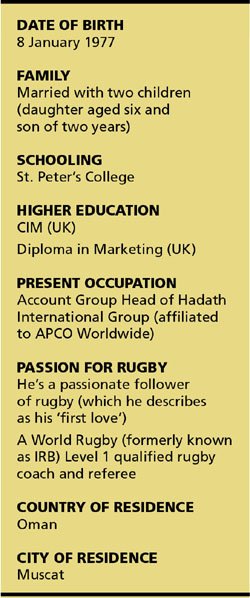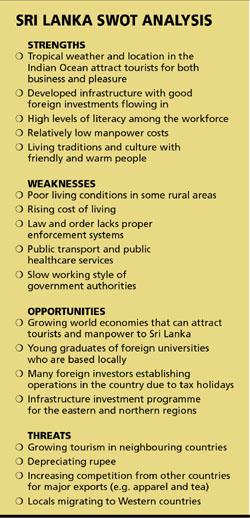SRI LANKANS OVERSEAS

SRI LANKA’S WORK IN PROGRESS
Hamza Hidayathullah is impressed by Sri Lanka’s post-war progress but says
there’s much more to do

Q: Could you tell us how your compatriots in Oman view Sri Lanka?
A: I have been living in Oman for the last five years, and travelled across the Middle East and to other Western countries many times. I’m proud to say the locals here have very positive views on Sri Lanka mainly because of the beauty of our little island and the people they meet here in Oman. Some of them have even visited Sri Lanka a few times on holiday.
I’m also very proud to see the Sri Lankan tea brand Dilmah served on Oman Air, as well as at Costa Coffee outlets and some five-star hotels in this country. Many Omanis love our tea compared to other products in the market.

Q: And how do you perceive Sri Lanka vis-à-vis the progress it is making in the post-war era?
A: I believe that the country is progressing at a decent pace with infrastructure being developed and new foreign investors coming in. Some of these large projects will also create many employment opportunities for the younger generation.
That being said, the law and order situation in the country should be improved. This has been the main setback in attracting tourists and foreign investors to our paradise island.
If Dr. Mahathir Mohamad and Lee Kuan Yew saw Sri Lanka growing at a more rapid pace than Malaysia and Singapore prior to the war, and made it an example to build Malaysia and Singapore, I don’t see why Sri Lanka can’t return to that era today.
Q: When did you last return to your country of birth? What were your impressions of Sri Lanka and how much had it changed from the past, in your assessment?
A: I last visited in December 2015 to spend three weeks with my family, having been away for 18 months. Indeed I noticed major progress in terms of the roads as well as new restaurants and businesses that had opened, together with the latest luxury cars. This is a very positive development.
I travelled down south and to Kandy for a few nights, and was surprised by how many new hotels there are. But there’s a significant increase in the cost of living – I was shocked to see the price of some essentials and daily items at the local supermarket.
Q: As for brain drain, how and why is there still no reversal of it? If Sri Lanka wants to retain the talent it has, what must it do?
A: I feel that there are two categories to consider here. Some leave the country for good, hoping to obtain permanent residency (PR) in a developed country such as Australia, Canada, the UK or even New Zealand with their families. They could be highly skilled and may not have sufficient opportunities to earn what they can in Sri Lanka.
The second category consists of people who venture overseas for shorter stints – mainly to the Middle East – who must return some day as they will not be granted PR in those countries. In the main, they leave to earn and save as they’re paid more than in Sri Lanka for the same job in these countries.
I know people who came to Oman on two-year contracts but ended up living here for over 20 years as they fall in love with the place, lifestyle, people and more importantly its culture. They’ve basically seen this place developing in every aspect.

Q: Can Sri Lankans living overseas be enticed to contribute or return to their country of birth – and if so, what needs to be done?
A: We all have to agree that there’s no place like home no matter where you are in the world. But we should also have a better earning capacity with access to quality education, and law and order in the country. These are the three key areas that I’d consider to be important.
I would like to share an interesting quote from the former Prime Minister of Singapore Lee Kuan Yew: “A nation is great not by its size alone.
It is the will, the cohesion, the stamina, the discipline of its people and the quality of their leaders that ensure it an honourable place in history.”
Q: In your view, on what should Sri Lanka focus most in the coming decade?
A: As a growing economy with much debt, we should focus more on foreign investments and exports by supporting local produce or products to take them out to the world. A viable infrastructure development plan that covers road, public schools and hospital facilities – especially in rural areas – is a key aspect on which we should focus.
Q: And last but not least, your hopes for the country of your birth in the post-conflict era are…?
A: Firstly, the government needs to resettle all the people who were affected by the war in the north and east who still live in temporary accommodation. It must also attract foreign investment to create more jobs within the country.
We also need to completely stop all racist and hateful campaigns around the country, irrespective of who engages in them and at what level. If not, this could be blown out of proportion and may lead to another ‘ethnic conflict.’
– LMD




A very good interview! Keep up the good work Hamza, your parents would have been very proud of you!
Having said that, as a Sri Lankan living overseas, I second your opinion about the cost of living and the law and order in the country. Road rage has to be controlled and respect for elders and women has to be inculcated in growing children so that the coming generations will be better citizens.